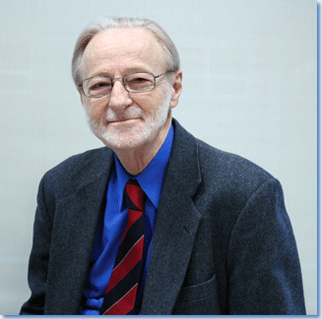 James J. Lorence, professor emeritus of history at University of Wisconsin-Marathon County (UWMC), died on June 19, 2012 in Wausau, Wisconsin. Born November 18, 1937 in Racine, Wisconsin, he devoted his life to the pursuit of excellence in teaching and scholarship.
James J. Lorence, professor emeritus of history at University of Wisconsin-Marathon County (UWMC), died on June 19, 2012 in Wausau, Wisconsin. Born November 18, 1937 in Racine, Wisconsin, he devoted his life to the pursuit of excellence in teaching and scholarship.
He earned his bachelor's and master's of science in history from the University of Wisconsin-Milwaukee, and then pursued his doctorate in American history under the guidance of Professor William Appleman Williams at the University of Wisconsin-Madison. From 1967 to 2001 he taught American history to freshman and sophomore students attending UWMC. He then accepted appointment as the first Eminent Scholar of History Chair at Gainesville State College of the University System of Georgia, a position he held for five years. Returning to Wausau in 2006, Lorence was named a senior fellow at the Wisconsin Institute for Public Policy and Service (WIPPS), located on the UWMC campus.
Teaching and scholarly research were closely connected in his mind, and he established demanding standards for himself in both. His classroom career spanned the social revolution in American society; he put himself at the cutting edge of incorporating the roles of women, minorities and social classes into his classroom presentations. His two-volume document set, Enduring Voices, which was designed to accompany Paul Boyer, et al.'s widely used textbook, Enduring Visions, attests to his efforts to make this history alive for students. Early on, he also recognized the value of film as a teaching tool to bring to life the concepts he was emphasizing in his classes. He shared his experiences in this area in Screening America: United States History Through Film Since 1900. His teaching accomplishments brought numerous awards, including the Emil Steiger Award for Excellence in Teaching (U.W. System, 1970) and the Carnegie CASE Wisconsin Professor of the Year, 1994–95, as well as election to the Teaching Division of the American Historical Association (1993–95).
To him professional development was important not only for university professors, but also for high school faculty. To address this latter group, he established the Marathon County History Teaching Alliance, a collaboration of UWMC history faculty and Central Wisconsin high school history teachers. He insisted on two rules: history teachers, whether high school or university, were to be recognized as professional colleagues and the sessions were to concentrate on historical issues. Day-long meetings were held monthly during the academic year. Lorence drew on nationally known scholars as well as outstanding historians of the University of Wisconsin System to lead these sessions. Founded in 1980, variations of this program continued under his successors in the History Department at UWMC. Recognition of the success of this program came with the awarding of the Beveridge Family Teaching Prize to the Teaching Alliance at the AHA meeting in Seattle in 1998. As a member of the Wisconsin Labor History Board, he further reached out to high school history programs by assisting in the development of the Wisconsin Department of Public Instruction's labor history curriculum entitled "Lessons in Labor History."
Lorence's first publication was The American Asiatic Association, Organized Business and the Myth of the China Market, 1898–1907, based on his dissertation and graduate work in American foreign policy. His teaching obligations in central Wisconsin, however, made research in foreign policy materials difficult. He turned to local history, mining the resources of the Marathon County Historical Society to co-author Woodlot and Ballot Box: Marathon County in the Twentieth Century and writing the biography of a local New Deal politician, Gerald J. Boileau and the Progressive Farmer Alliance in Politics of the New Deal. He also exploited local resources concerning the German-American socialists of early twentieth century Central Wisconsin for several journal articles. Beginning in the mid-1990s, his publications consistently dealt with labor history. His work in this area took him on constant research travels to review source materials. His patient and constant companion, his wife Donna, accepted that their vacations were journeys to archives and interviewees for his next publication. Two books, Organizing the Unemployed: Community and Union Activists in the Industrial Heartland and Suppression of Salt of the Earth: How Hollywood, Big Labor and Politicians Blacklisted a Movie in Cold War America, preceded his move to Georgia. In his new location he again found materials on labor movements, and wrote A Hard Journey: The Life of Don West and The Unemployed People's Movement: Leftists, Liberals and Labor in Georgia, 1929–1941. The quality of his work was recognized with numerous awards for his books.
Upon his return to Wausau, Lorence continued his scholarly activities. Long a supporter of progressive politics in central Wisconsin, he edited the memoir of his friend, former Congressman Dave Obey, Raising Hell for Justice. As a Senior Fellow at WIPPS, he worked on organizing the materials of Congressman Obey's political career and on finishing his biography of Clinton Jencks, which is due out later this year. The Lorence papers are now a part of the permanent collection of the Wisconsin Historical Society.
Jim Lorence was a teacher and scholar who enhanced the lives of countless students and enriched the fields of local and labor history. A warm and generous person, he will be missed by colleagues and his many friends, but most of all by the love of his life, Donna Nyiri Lorence, and their two daughters and their families.
—Harlan D. Grinde
University of Wisconsin-Marathon County (emeritus)
Tags: In Memoriam
Comment
Please read our commenting and letters policy before submitting.






